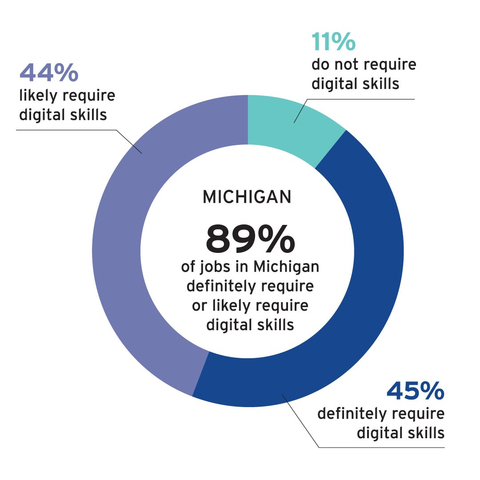New Data Shows Nearly 90% of Michigan Jobs Require Digital Skills, One-Third of Workers Currently Have Low or No Digital Skills

(Graphic: Business Wire)
The findings come at a pivotal moment as states plan to implement the historic
“By closing the skills gap, we can better prepare Michiganders for economic opportunity, increase workforce readiness, and build on the work we’ve done to connect homes and businesses to high-speed internet,” said Michigan Lt. Gov. Garlin Gilchrist II. “Digital skills training gives people the tools to benefit from their connected communities and can improve the lives of people across the state of Michigan.”
Over the next year, the NSC will work with policymakers, its member state coalitions, Comcast, and non-profit partners to ensure local, state and national leaders are aware of and take advantage of public sector digital equity funds to invest in skill development programs.
“This new research demonstrates the urgency—and the payoff—if
The new report also found that public investments to close this digital skill gap can generate measurable economic payoff for workers, businesses and the broader economy. For workers, moving from a job that requires no digital skills to one that requires just one digital skill can yield a
The demand for digital skills was found across every industry and in almost every occupation, including entry-level and frontline positions. The most in-demand digital skills in
“Gaining a new digital skill is like turning on the electricity after a lifetime of burning candles,” said Marcus Keech, Grand Rapids Chamber director of government affairs. “Our goal is to fuel the continued growth of our workforce by working together with policymakers, business leaders, and organizations like Comcast to address gaps and accelerate workforce potential—supporting digital skills education will help us do exactly that.”
To support Michigan’s digital equity journey, Comcast has invested more than
“Digital skills training unleashes the potential of high-speed internet within homes and businesses,” said Craig D’agostini, Comcast vice president, government & regulatory affairs. “We’re proud to be a partner in Michigan’s digital equity journey, and to continue to work with policymakers and community leaders to close the digital divide. Together, we can ensure the success of Michigan’s workforce, today and tomorrow.”
Project UP is Comcast’s
-
The Comcast Internet Essentials program provides low-cost, high-speed broadband service to income-constrained households, connecting more than one million students, parents, veterans and seniors in
Michigan . -
Comcast also participates in the federal government’s Affordable Connectivity Program (ACP), which provides qualifying households a
$30 -
Comcast operates more than 60 Lift Zones across
Michigan . Lift Zones are robust Wi-Fi hotspots in safe spaces designed to help students get online and participate in remote learning. Many sites also serve adults and can connect them to job searches, healthcare information and public assistance, and digital skills content.
About National Skills Coalition
National Skills Coalition fights for inclusive, high-quality skills training so that people have access to a better life, and local businesses see sustained growth. We engage in analysis and technical assistance, organizing, advocacy, and communications to improve state and federal skills policies.
About Comcast Corporation
Comcast Corporation (Nasdaq: CMCSA) is a global media and technology company that connects people to moments that matter. We are principally focused on broadband, aggregation, and streaming with over 56 million customer relationships across
View source version on businesswire.com: https://www.businesswire.com/news/home/20240122501130/en/
Press:
National Skills Coalition
Nicky Lauricella Coolberth
nickylc@nationalskillscoalition.org
Comcast – Heartland (
Amy Pietzak
248-318-8906
amy_pietzak@comcast.com
Samantha VanHoef
734-478-7118
samantha_vanhoef@comcast.com
Source: Comcast Corporation








